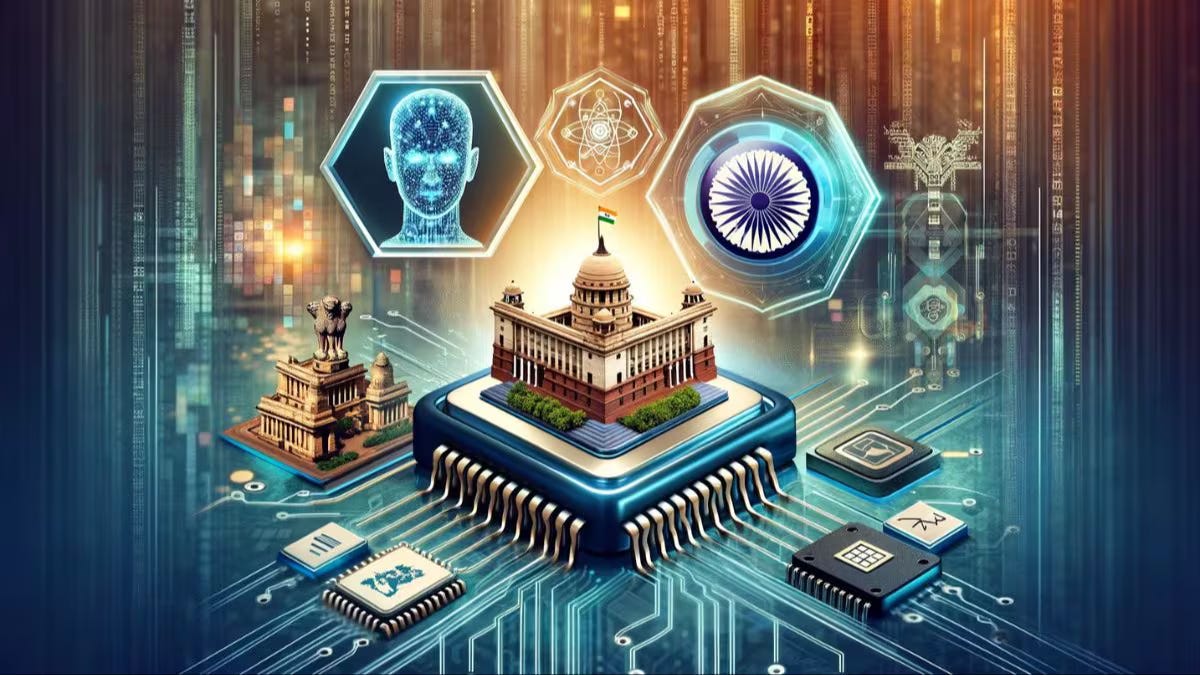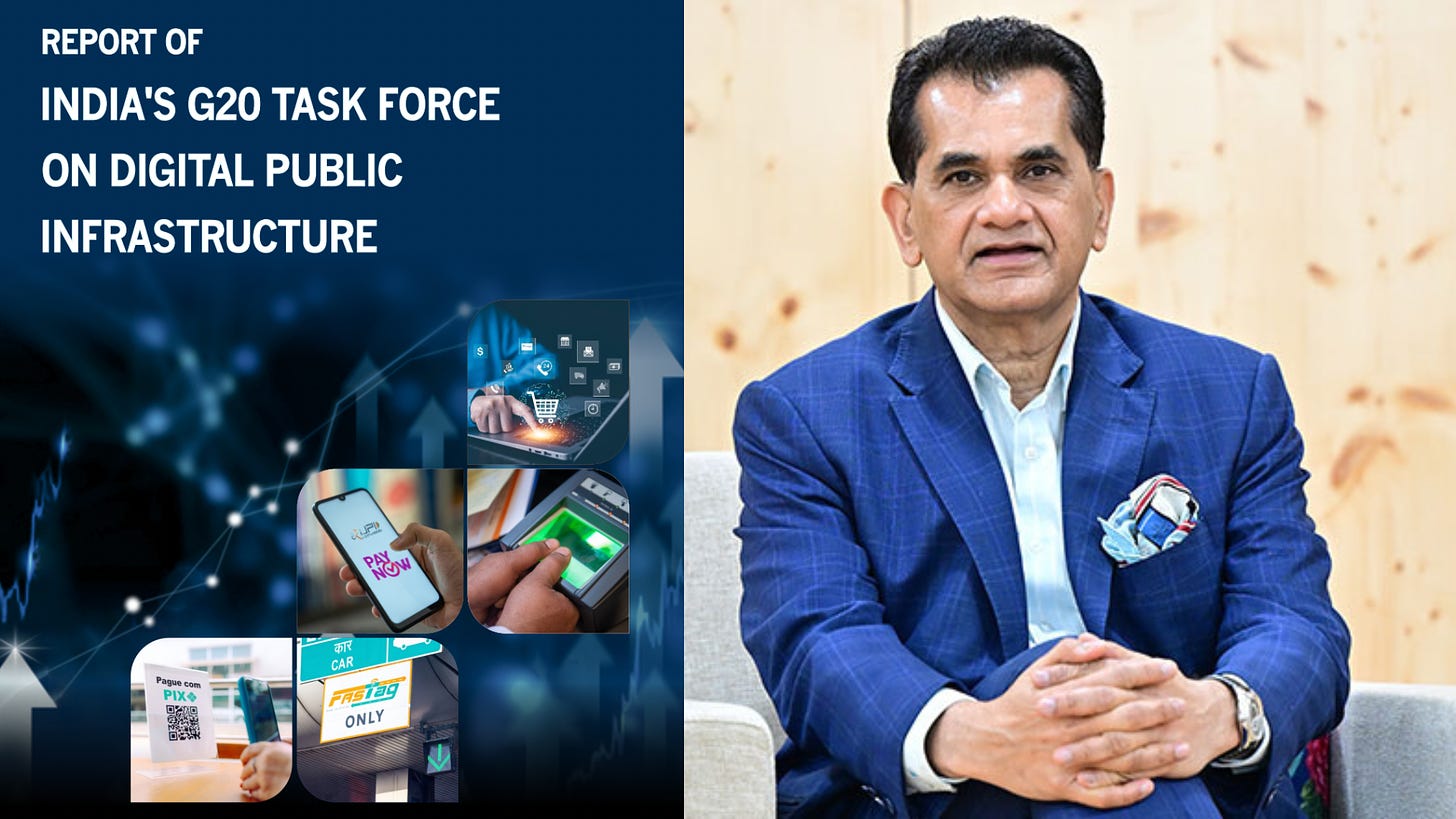India’s Path to an AI and Digital Future: Key Highlights from the Budget & Economic Survey and more
The AI4India Weekly #10
Welcome to the 10th Edition of The AI4India Weekly!
We are thrilled to bring you the latest insights and updates in the world of AI with the 10th edition of the AI4India Weekly. Our feature story this week provides an in-depth analysis of the Economic Survey 2023-24 and the Budget announcement for 2024, highlighting the government's strategic focus on AI, the burgeoning AI startup ecosystem, and the numerous initiatives to prepare the workforce for AI-driven job roles. These developments underscore India's commitment to leveraging AI for sustainable and inclusive economic growth.
In addition to the Economic Survey, we cover a range of exciting topics in this edition like the pioneering efforts of India's G20 Task Force on Digital Public Infrastructure, the ambitious National Quantum Mission, and the Indian government's project to produce 22,000 books in Indian languages, an analysis of the disappearing data behind AI and more.
AI Revolution in India: Key Insights from the Economic Survey 2023-24
The Indian Economic Survey 2023-24, presented by Finance Minister Nirmala Sitharaman, underscores India's strong economic performance amid global uncertainties. The survey highlights the country’s remarkable growth in the technology sector, particularly in AI, with India now home to 13,000 startups specializing in AI, IoT, robotics, and nanotechnology. This positions India as a prominent player in the global AI arena, driving innovation and technological progress.
From the survey, AI is identified as a major disruptor in the future of work, presenting both risks and opportunities. India’s vast demographic dividend and youthful population position it uniquely to navigate these changes. Notably, the rise of Generative AI (GenAI) poses a risk to the BPO sector, where automation through chatbots is expected to reduce employment significantly over the next decade. However, the gradual diffusion of AI is anticipated to boost productivity, with India’s affinity for technology and proactive government and industry interventions providing a pathway to leverage these advancements effectively.
The survey emphasizes the importance of research and development in AI, advocating for the establishment of an Inter-Agency Coordination Authority for AI. This proposed body would guide research, policymaking, and job creation related to AI. The government has also introduced several initiatives to foster an AI-enabled ecosystem and connect AI with the youth. Notable programs include ‘Future Skills Prime,’ ‘YUVAi: Youth for Unnati and Vikas with AI,’ a national program for school students, and ‘Responsible AI for Youth 2022.’ Additionally, a substantial budget of ₹10,300 crore has been allocated in 2024 for the India AI Mission, aiming to enhance the AI ecosystem.
The survey also highlights AI's transformative potential across various sectors, including healthcare, agriculture, and finance. To harness this potential, the government is focusing on skill development to prepare the workforce for AI-driven roles, ensuring that the benefits of AI are widely distributed. Key initiatives such as the Digital India program and the National AI Strategy are crucial in cultivating an AI ecosystem that supports research, development, and deployment of AI technologies. Additionally, the survey stresses the importance of ethical AI, advocating for frameworks that align AI development with societal values and ensure equitable benefits for all.
Economic implications of AI are also addressed, noting its capacity to significantly enhance productivity and economic growth. AI adoption is expected to streamline operations, cut costs, and improve decision-making across industries. The government is committed to creating a supportive policy environment to attract investments in AI and related technologies, aiming to keep India at the forefront of the AI revolution. This strategic emphasis on AI aligns with India's broader goal of becoming a global economic powerhouse, leveraging technology to drive sustainable and inclusive growth.
Budget 2024: Accelerating India's Digital and AI Transformation
The 2024 Indian Budget, unveiled by Finance Minister Nirmala Sitharaman, emphasizes a transformative agenda for advancing the country’s digital and technological infrastructure. The Ministry of Electronics and Information Technology (MEITY) received a notable 52% increase in funding, underscoring the government's commitment to enhancing digital access and infrastructure. This boost will support critical upgrades to IT infrastructure, bolster cybersecurity measures, and expand digital literacy programs, thereby strengthening the overall digital ecosystem.
In addition to this significant funding increase, the budget highlights key initiatives in AI and digital innovation. A substantial allocation of ₹10,300 crore has been dedicated to the India AI Mission, aimed at propelling AI research and development across sectors such as healthcare, agriculture, and finance. The budget also proposes the creation of "population-scale Digital Public Infrastructures" (DPIs) to advance systems for credit, e-commerce, corporate governance, and legal and justice frameworks. These DPIs are designed to improve transparency, accessibility, and efficiency. Complementing these efforts are programs like the aforementioned ‘Future Skills Prime’ and ‘YUVAi: Youth for Unnati and Vikas with AI,’ which aim to equip the youth with crucial digital skills. Additionally, the proposal for an Inter-Agency Coordination Authority for AI seeks to centralize research, policy planning, and job creation, ensuring a cohesive approach to AI development. Together, these measures reflect India's strategic vision to lead in digital and AI technologies, fostering innovation and driving sustainable economic growth.
Pioneering Digital Transformation: India’s G20 DPI Task Force Report
India's G20 Task Force on Digital Public Infrastructure (DPI) has released a groundbreaking report under its G20 Presidency. Co-chaired by Amitabh Kant and Nandan Nilekani, the report outlines a comprehensive framework for leveraging DPI to drive global economic transformation, financial inclusion, and sustainable development. Highlighting India's digital advancements, the report emphasizes DPI’s role in transforming governance and achieving the UN's Sustainable Development Goals.
The report's focus on enhancing DPI will significantly boost AI development in India. Improved digital infrastructure will enable better data accessibility and integration, facilitating the creation of advanced AI models and applications. This will drive AI-driven innovations in sectors like finance, healthcare, and education, positioning India as a global AI leader. The task force's vision will encourage investment in AI research and development, fostering a robust ecosystem for AI startups and collaborations between academia, industry, and government.
India's strategic emphasis on DPI aligns with its national AI strategy, promoting responsible and inclusive AI growth. By ensuring reliable and accessible digital public infrastructure, India can harness AI's potential to drive economic growth, improve public services, and enhance the quality of life for its citizens. This initiative not only benefits India but also serves as a model for other countries aiming to leverage digital technologies for sustainable development and inclusive growth.
India's National Quantum Mission: Bridging the Gap and Its Impact on AI
India's National Quantum Mission, launched with a budget of ₹6,000 crore, is a strategic initiative to advance the nation's quantum technology capabilities. The mission's objectives include developing quantum computers, quantum communication systems, and quantum-enhanced sensors. It also aims to establish a robust quantum research ecosystem through new institutions and partnerships.
The mission seeks to address existing gaps by investing in fundamental research and infrastructure to compete with global leaders. It includes setting up a network of quantum computing and communication laboratories, promoting collaborations between academia and industry, and creating educational programs to build a skilled workforce.
The integration of quantum computing holds significant promise for artificial intelligence by dramatically enhancing computational power and efficiency. Quantum algorithms could transform data analysis, pattern recognition, and complex problem-solving, leading to breakthroughs in machine learning and AI applications. As India advances in quantum technology, it is expected to catalyze the development of sophisticated AI solutions, positioning the country as a major player in the global AI landscape.
Centre Launches Project to Produce 22,000 Books in Indian Languages
The Indian government has initiated a landmark project to publish 22,000 books in various Indian languages, aiming to enhance linguistic diversity and accessibility to knowledge. This initiative will focus on translating and publishing a wide range of works, from literature to science, making educational resources more available across different regions. The initiative is expected to boost the availability of quality educational resources in regional languages, enhancing learning opportunities and bridging gaps in educational materials.
This project could significantly benefit the field of AI by expanding the linguistic data available for natural language processing (NLP) models. As more books and texts are published in regional languages, AI systems can be trained on a richer and more diverse dataset, improving language models and translation technologies. Enhanced NLP capabilities will not only support better language recognition and translation but also foster the development of AI applications tailored to regional linguistic needs and cultural contexts.
Indian Railways Embraces AI for Superior Linen Hygiene
Indian Railways is harnessing the power of artificial intelligence to enhance the cleanliness and hygiene of train linen. In a significant move towards modernization, the railway network has introduced AI-powered machines to ensure the highest standards of cleanliness for the linen used by millions of passengers. These state-of-the-art machines are designed to automate the sorting, washing, and distribution processes, significantly improving efficiency and reducing the likelihood of human error.
The AI technology employed in these machines can detect and categorize different types of stains, optimize washing cycles, and even track the usage history of each linen piece to ensure it meets stringent hygiene standards. This innovative approach not only enhances the passenger experience by providing cleaner, fresher linen but also represents a major step forward in Indian Railways' commitment to leveraging technology for operational excellence. By integrating AI into its linen management system, Indian Railways sets a new benchmark for cleanliness and efficiency in the transportation sector.
The Disappearing Data Behind AI: A Growing Concern
A recent study by the Data Provenance Initiative highlights a troubling trend: essential data for training AI models is rapidly becoming inaccessible. Over the past year, many key web sources have restricted their data, leading to a significant reduction in available resources. Approximately 5% of all data and 25% of high-quality data in prominent AI training sets are now off-limits. These restrictions, often enforced through robots.txt files or revised terms of service, pose significant challenges for AI developers, researchers, and non-commercial entities relying on freely accessible data.
This trend raises concerns about the future of AI development, as the quality and quantity of training data are crucial for creating robust and reliable models. With the increasing commercialization and protection of data sources, the AI community must seek alternative solutions to address this data scarcity. Potential approaches include developing new data-sharing agreements, enhancing data generation techniques, and advocating for more open-access policies. The ongoing data disappearance underscores the need for a balanced approach that respects data privacy and ownership while supporting innovation and progress in AI.
NOTE : The views expressed by the authors are their own. AI4India as a forum does not endorse any comments on specific brands, products, platforms or companies.
Join our AI4India.org forum to be a part of the AI revolution in India by visiting our site now.
Follow us on our X and LinkedIn to receive interesting updates and analysis of AI-related news











